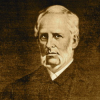Tryon Edwards

Tryon Edwards
Tryon Edwards was an American theologian, best known for compiling A Dictionary of Thoughts, a book of quotations. He published the works of Jonathan Edwardsin 1842. He also compiled and published the sixteen sermons of his great grandfather, Jonathan Edwards, on 1 Corinthians 13, the "Love Chapter", titling the book "Charity And Its Fruits; Christian love as manifested in the heart and life", which was thought by some to be the most thorough analysis of the text of 1 Corinthians...
NationalityAmerican
ProfessionTheologian
CountryUnited States of America
Never think that God's delays are God's denials. True prayer always receives what it asks, or something better.
The leaves do not change color from the blighting touch of the frost, but from the process of natural decay. They fall when the fruit has been ripened and their work is done. And their splendid change of coloring is but their graceful and beautiful surrender of life, when they have finished their summer offering of service to God and man.
Ridicule may be the evidence of with or bitterness and may gratify a little mind, or an ungenerous temper, but it is no test of reason or truth.
True art is reverent imitation of God.
Words are both better and worse than thoughts, they express them, and add to them; they give them power for good or evil; they start them on an endless flight, for instruction and comfort and blessing, or for injury and sorrow and ruin.
If rich men would remember that shrouds have no pockets, they would, while living, share their wealth with their children, and give for the good of others, and so know the highest pleasure wealth can give.
Sincerity is not test of truth-no evidence of correctness of conduct. You may take poison sincerely believing it the needed medicine, but will it save your life?
He that is possessed with a prejudice is possessed with a devil.
Right actions for the future are the best apologies for wrong ones in the past - the best evidence of regret for them that we can offer, or the world receive.
True religion extends alike to the intellect and the heart. Intellect is in vain if it lead not to emotion, and emotion is vain if not enlightened by intellect; and both are vain if not guided by truth and leading to duty.
Anecdotes are sometimes the best vehicles of truth, and if striking and appropriate are often more impressive and powerful than argument.
Whatever our place allotted to us by Providence that for us is the post of honor and duty. God estimates us, not by the position we are in, but by the way in which we fill it.
Credulity is belief in slight evidence, with no evidence, or against evidence.
Some men are born old, and some men never seem so. If we keep well and cheerful, we are always young and at last die in youth even when in years would count as old.